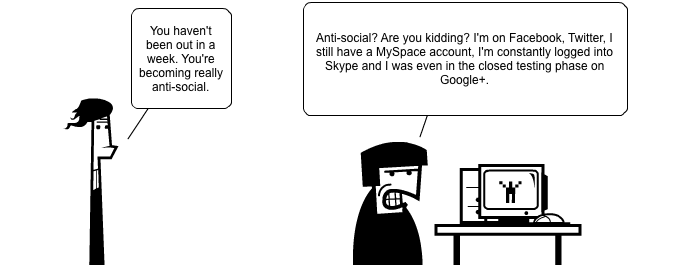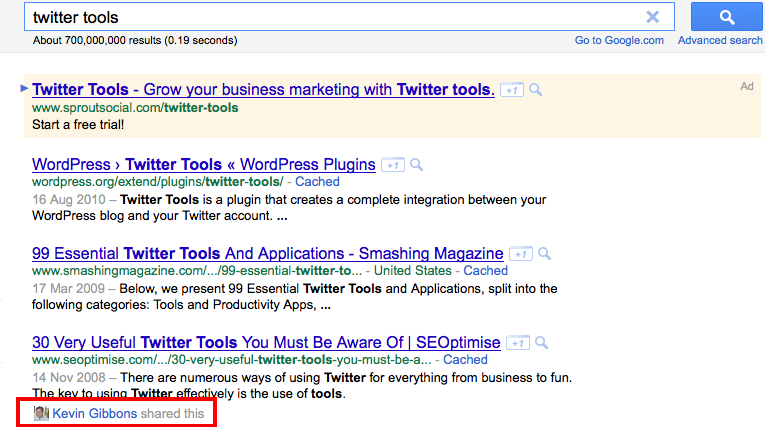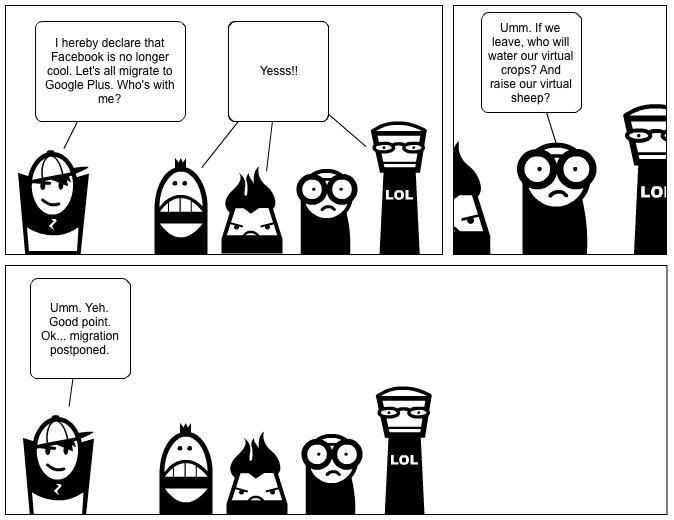
Image made using Stripgenerator.com
SEO isn’t what it was five years ago. Or even two years ago. Even 6 months ago, come to think of it.
The past year has changed a lot in search. Google and its smaller counterparts are finding innovative ways of determining what quality is, whether sites can be trusted and how people are engaging with your site. More importantly, they’re using these indicators to decide, in part, where you should rank for your keywords within the search engines.
It has been possible to achieve decent search rankings without a social media presence, without a Google Places listing… without even having a real brand presence. But that’s all changing and it’s changing in the favour of the end user – the people who use the search engines to find what they are looking for.
I’m not suggesting that the algorithm is perfect and that only people who have a great, organic link profile and a wonderful following on social media platforms will rank. We will always encounter cases where someone, somewhere manages to achieve high rankings by manipulating the algorithm.
But there are four areas in particular that, in my opinion, can no longer be excluded from the remit of a SEO.
Social Media

We know a few things for sure about social media:
- Facebook has 750 million registered users
- Twitter enjoys 200 million ‘Tweets’ a day
- Google+ achieved a rumoured 10 million registered members within less than 3 weeks of launch
- There are 101 million users on LinkedIn
- LinkedIn is used by 69 of the US Fortune 100 companies
- In June 2011, 12.54% of all traffic to websites in the UK came from a social network (mostly Facebook and Youtube). Source: Experian Report. This puts social media networks second only to search engines as a source of traffic.
- There are 700 billion minutes per month spent on Facebook and the average user creates 90 pieces of content on the site per month and is connected to 80 community pages, groups or events. Source: Facebook.
Pretty impressive, but how does that link in with search engine optimisation? Well:
- Google’s social search now means that opted in logged in users will see search results that are affected by what people in their social networks have shared.

- Google uses ‘social signals,’ as a ranking factor. To quote Google’s Head of Web Spam, Matt Cutts, “I filmed a video back in May 2010 where I said that we didn’t use that as a signal, and at the time, we did not use that as a signal, but now, we’re taping this in December 2010, and we are using that as a signal.”
- We also know that a site that is widely engaged with on a social media level is likely to accrue natural back links – something that definitely still plays (as it always has) a vital role in SEO.
Conclusion: How can social media NOT be an integral part of a rounded SEO campaign? Failing to integrate it doesn’t only mean you’re missing out huge online branding potential, but you could be hindering your rankings too.
Web Content and Blogging
SEOs have always known the value of having unique content that it is unique to your site. But since Google’s Panda update which rolled out in the US in February 2011 and in the UK in April 2011, it’s even more critical.
Poor content on even just a handful of pages on your site could hinder the whole site.
It’s not just about getting keywords into content. It’s about:
- Creating content with a fresh, original angle.
- Creating new content for your site regularly
- Creating content that could attract long tail traffic
- Creating content that is ‘social media friendly,’ and shareable. Content is the most powerful tool you have to incite social media users to share your links with their network. This in turn affects rankings.
Conclusion: Frequently updated, fresh and original content is essential to rankings. It therefore goes without saying that on some level this comes under the SEO’s remit, whether on a ‘giving advice’ level or getting hands on with the content themselves.
Local Presence
Google Places listings now pop up above organic search results for the vast majority of searches with a geographic element in them. They also show up for a host of searches where there is no geographical element. Having a claimed, verified and optimised Google Places listing has multiple benefits:
- More ‘SERP Real Estate.’ That is to say if you have a local presence and an organic presence on the results pages, your business has more space than others on the page. This means more clicks, more traffic and ultimately more business.
- This verifies to users and search engines alike that you are a real business with real premises
- This, in turn, adds to user trust of your site.
- And this again plays a part in a complex Google ranking algorithm
Online PR and Reputation
A part of Google’s algorithm is based on rewarding ‘trusted’ websites. This means finding your company’s brand, link or mentions on other trustworthy places on the Internet.
Google ultimately wants to produce an algorithm that delivers the highest quality, most relevant and trusted websites to its searchers. This means identifying ranking factors that are more difficult for spammers to manipulate and one such factor is this trusted brand element. As such, I can only see this becoming increasingly prominent.
In addition to that, the rise of social media has given a voice to consumers – both in a good and bad way! Someone searching for your brand on Google is likely to find your site first and possibly even second and third too. But what comes beneath that on the first page could be anything. It could be a blog post written about your company or a forum thread about them. It could be positive or negative.
SEOs are now often also charged with ensuring that you are building a positive brand online, that searches for your brand result in users finding your site, your social media profiles and other similar things.
Mobile
Thanks to smartphones we don’t have to be sitting in front of a laptop or desktop computer to find what we are looking for. We can be out and about and hunting out what we need. This is giving rise to increasing numbers of searches from mobile devices. Our job, as SEOs, is to:
- Understand which devices your audience is visiting your site from
- Ensure they’re finding your website when they’re looking for your products and services from a mobile
Part of the process may involve recommending a mobile website or similar in order not to exclude users on the move from your site. But as SEOs, our job is to make sure we understand your website traffic inside out and can make recommendations accordingly.
But the point is that SEOs simply cannot afford to ignore mobile. As Eric Schmidt himself conceded, mobile is ‘growing faster than any of us anticipated.’
In Conclusion
This really is a quick overview. I’ve already broken my, ‘don’t waffle on for 1000 words’ in a blog post rule despite this being a fairly brief insight.
But the fact is that search engines are becoming smarter. They’re getting better and better at identifying a site’s true value to a user and they’re embracing the social media age. As such, a 360 degree approach is no longer an ‘added bonus’ in SEO. It’s absolutely vital.









